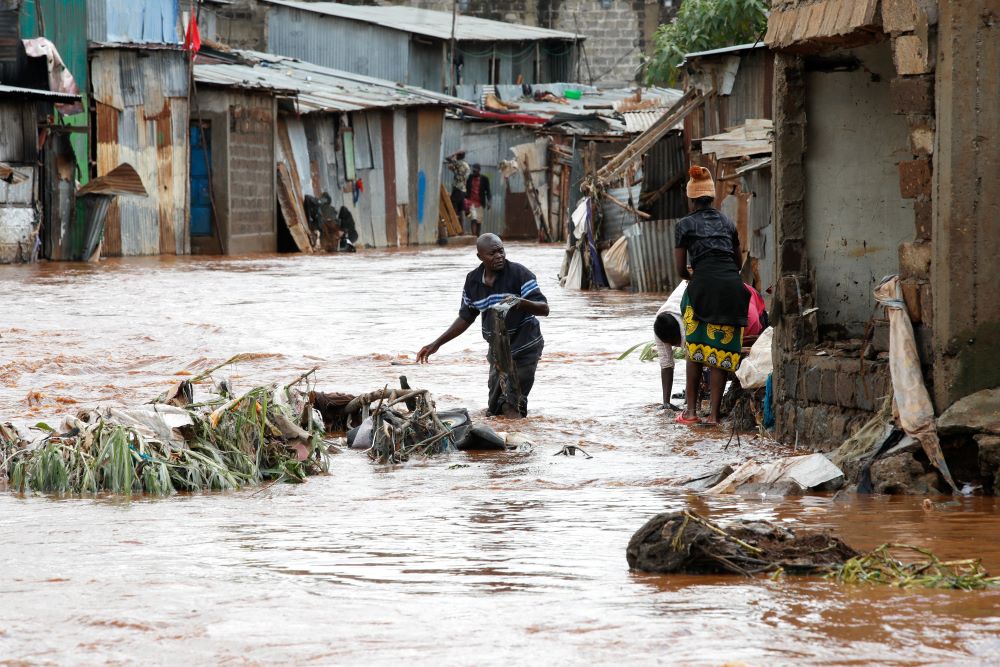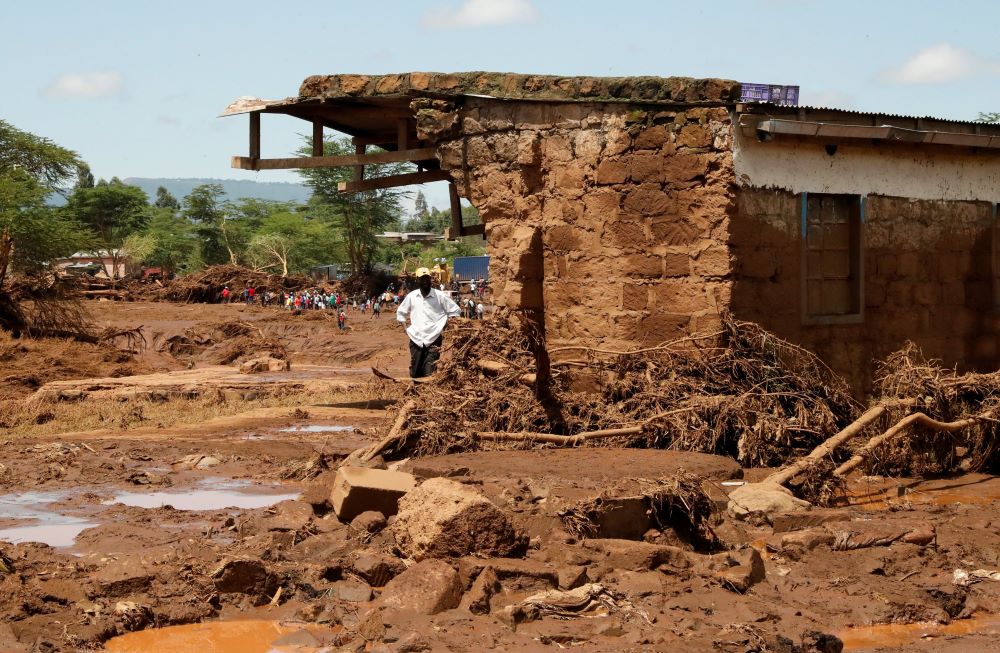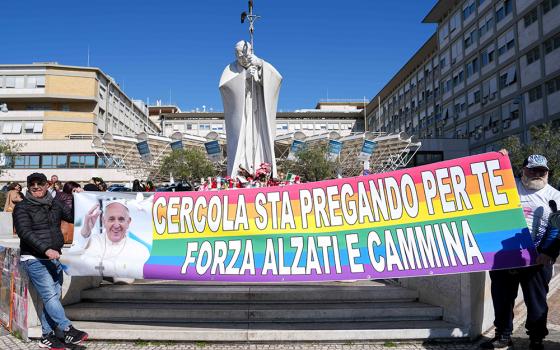
Residents wade through flood waters as they recover their belongings in the Mathare Valley settlement of Nairobi, Kenya, April 24, after the Nairobi River burst its bank. The east African country has experienced severe flooding since March, during some of the most catastrophic weather events the country has seen in years. (OSV News/Reuters/Monicah Mwangi)
The Kenya Conference of Catholic Bishops has called for "swift action" and "generous acts of charity" to mitigate effects of flooding that has so far left more than 250 people dead and a trail of property damage.
During a joint press conference May 7, the bishops commended Catholics for the quick response to their appeal for support across all Catholic dioceses in Kenya, and lauded Pope Francis for expressing his "spiritual proximity" with God's people in Kenya. They challenged both county and national governments to mobilize their disaster management resources with "greater urgency" to prevent further deaths and destruction.
The east African country has experienced severe flooding since March, during some of the most catastrophic weather events the country has seen in years. Kenyans had been apprehensive about the effects of Cyclone Hidaya, which hit neighboring Tanzania May 4. Kenya experienced only minor damage from the cyclone, the first to hit the country, but meteorologists say rain and flooding could continue through the month.
The Kenyan Catholic bishops called the ongoing events "catastrophic." At least 257 people have died as a result of the flooding, with some 188 people missing as of a May 8 update from Kenya's government spokesman. In addition, nearly 55,000 households have been displaced, affecting more than 293,000 people. Crops on nearly 10,000 acres have been destroyed, according to the statement.

A man looks at the ruins of a house in the Kamuchiri village of Mai Mahiu in central Kenya's Nakuru County April 29. Heavy flash floods wiped out several homes when a dam burst, following heavy rains. (OSV News/Reuters/Thomas Mukoya)
The bishops said many families and individuals "are struggling to cope with the immediate aftermath of this disaster" and "the rains continue to fall, exacerbating the already dire situation."
"Now is the time to utilize resources allocated for such crises effectively. We call for swift action to save lives, protect property, and, in areas where the rains have subsided, begin the necessary work of rebuilding and rehabilitation," they said.
In the town of Mai Mahiu in southern Kenya, a dam burst April 29, killing at least 48 people. Located in Nakuru County in the west of the capital, Nairobi, Mai Mahiu was expected to be hit by more heavy rains, according to a warning Kenya's Meteorological Department issued on X.
Although meteorologists link the increased flooding to climate change, many Kenyans believe the situation has been exacerbated by the government's lack of investment.
In Mathare, an informal settlement on the outskirts of Nairobi, locals blamed the flooding on poorly maintained, frequently blocked drains that have caused water to accumulate.
At the end of April, the ministry of interior ordered thousands of people living near rivers, dams and other flood-prone areas to vacate. The government has begun bulldozing homes built in flood-prone areas.
Kenya's President William Ruto, while visiting the vast Mathare informal settlement along the Nairobi River on May 6, said evicted families whose houses had been demolished would be given 10,000 Kenyan shillings ($75) to relocate after a deadline to evacuate to safer grounds had passed.
Residents and motorists walk along the Mai Mahiu-Naivasha highway in the Kamuchiri village of Mai Mahiu in central Kenya's Nakuru County April 29. Heavy flash floods wiped out several homes when a dam burst, following heavy rains. (OSV News/Reuters/Thomas Mukoya)
On May 7, bulldozers could be seen ripping through iron-sheet walls, to the dismay of locals who have been left homeless. Security forces with guns and batons stood guard and fired tear gas canisters at some residents who dared to defy the evacuation orders.
"We are already vulnerable and the governments who ought to come to our aid are sending us packing with nowhere to go. They should find a means of relocating us to safe havens before bringing our structures down," said Millicent Awuor, a flood victim.
Opposition leader Raila Odinga warned the government against demolishing more houses without a resettlement plan in place. Affected residents and Human Rights Watch have blamed the government for inadequate response and lack of preparedness to combat the issue.
Still, government spokesperson Isaac Mwaura on May 8 reiterated an evacuation order to 200 families living in the Kijabe area, some 70 miles from Nairobi, where about 60 people were killed and houses were swept away when water broke through a blocked railway tunnel recently.
In a statement, Mwaaura said 192 dams had been identified as high risk. "Consequently, varied evacuation exercises are being undertaken across the country, following a 24-hour evacuation notice, which was effective on May 2nd, and which was issued to settlements in 33 counties that are within 178 of high-risk dams and water reservoirs," the statement said.
Kenya's Cabinet, concerned by rising water levels in the country's two major hydroelectric dams, Masinga and Kiambere, is calling on people living downstream to evacuate.
Advertisement
"It is against this backdrop that we, KCCB members, wish to express our profound sympathy and solidarity with all those affected by these devastating floods," the Catholic bishops said in a two-page statement signed by their chairman, Archbishop Maurice Muhatia Makumba of the Kisumu Archdiocese.
The clergy said they "share the grief" of family members of those who have died "during this disaster," and added, "In this time of sorrow, we stand united in prayer and support."
Alluding to specific incidents where a boat capsized in Garissa County, killing several people, and several households were swept away by raging waters in Mai Mahiu, the bishops expressed their spiritual solidarity, and urged "every Kenyan to exercise the utmost caution."
"Adults must take the lead in ensuring the safety of our children, particularly in areas prone to flooding. People should not take unnecessary risks. We implore communities to be vigilant and proactive in safeguarding every member, especially the most vulnerable," they said in the statement. "We have already initiated an appeal across all our Dioceses for our Christian faithful and Kenyans of goodwill to move with haste and help those in distress."
"The response has been good so far and we plead for more support to aid those in desperate need," they said, adding, "Let us show our love and compassion through generous acts of charity, reflecting the teachings of Christ in our actions."
They further emphasized the need for a collaborative approach in handling the challenging situation. "Together, we can overcome the challenges posed by these floods. Through collective effort and divine grace, we shall restore hope and rebuild our communities."







